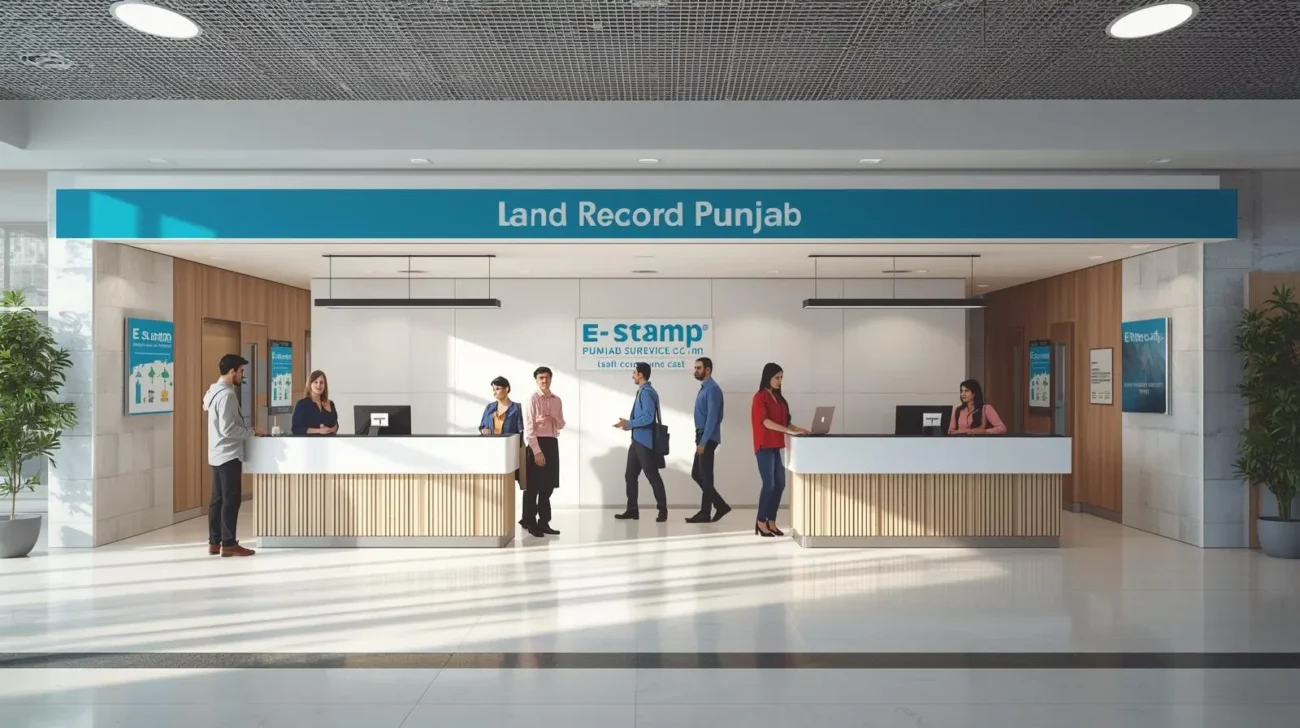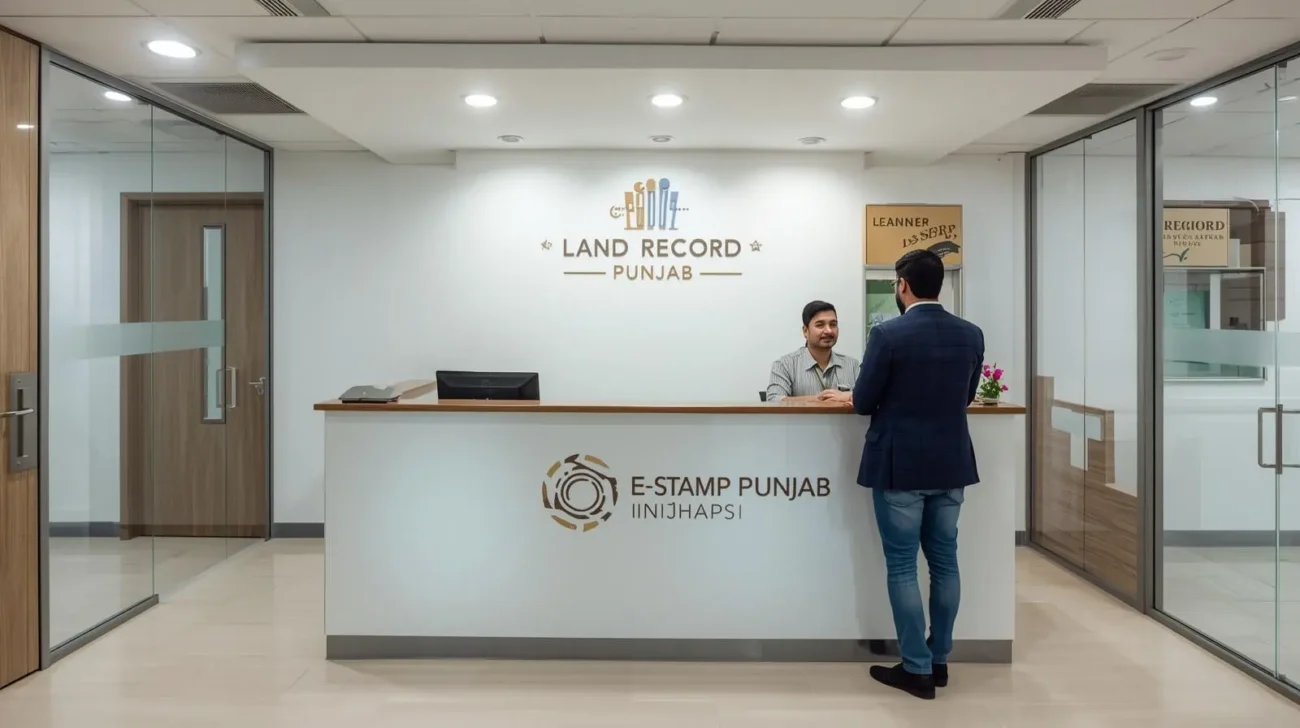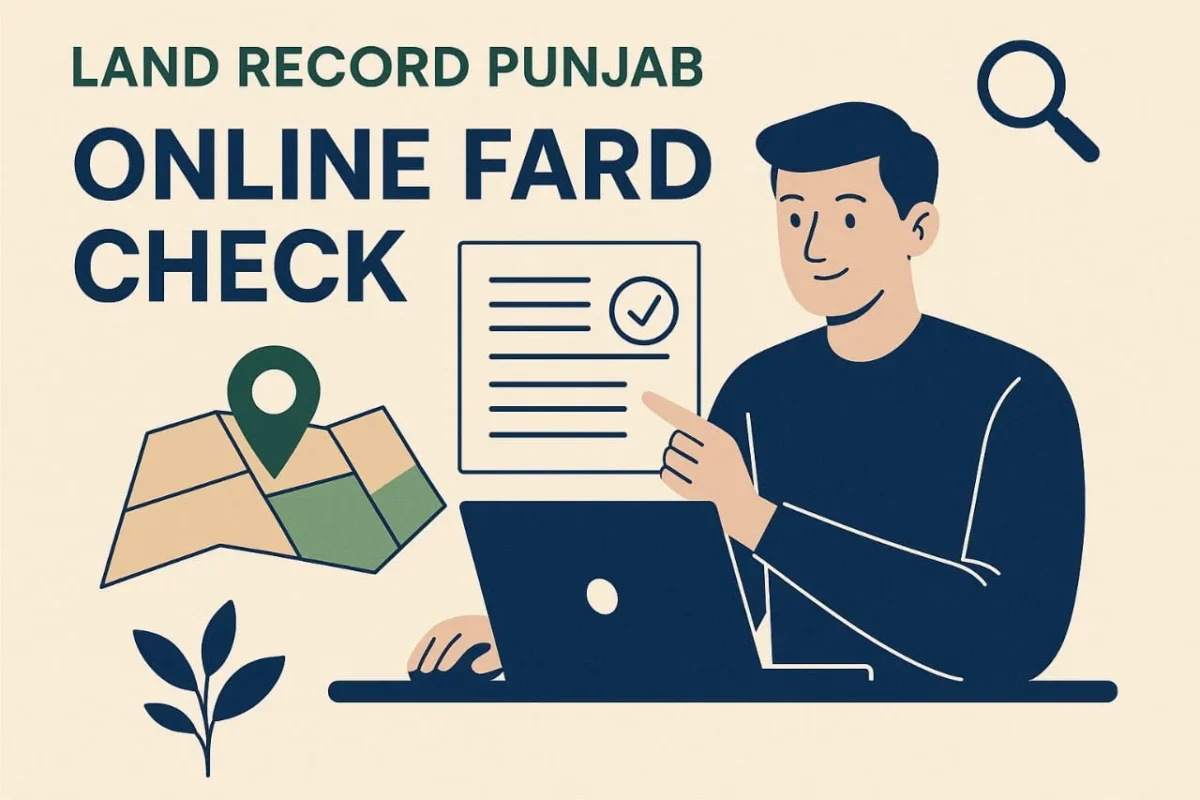An e stamp Punjab is the digital way to pay stamp duty for transaction of legal and official documents in state of Punjab. It does away with manual paper stamps and instead comes into play by an e-stamping system administered by the Punjab Revenue Department. Each stamps are generated in a secure manner authentic verified and appropriately coded not to be abused. The system provides transparency, accuracy and fast processing of transactions. On the whole, eStamp Punjab simplifies and secures the payment of stamp duty.
Evolution from Traditional Stamp Papers to E-Stamping
In the past, stamp duty on documents was paid using paper stamp(s) which was embossed or affixed on the documents. The traditional method of payment suffered from a lack of trust because of frequent fraud and manual errors. Due to the digitalization of public services, many governments developed e-stamp systems. Currently, in Punjab, e stamp punjab is replacing most paper based duties.
Importance of Estamping in Legal Property and Transactions
e stamp punjab simplifies the process of paying the stamping duty by allowing for instant verification and payment over the internet. It removes standard obstructions namely manual processing, physical stamp management, and human errors — resulting in a seamless experience for users. This process greatly improves efficiency especially during transactions of significant value such as property sale and purchase or contract signing. E-stamping helps users to save time as they can complete the entire legal process instantly, without physical presence in a government office or handling files. The Punjab estamp system not only ensures that documents are secure and authentic but also follows the government’s program of digital governance and financial visibility.
Definition and Features of E-Stamping
E-stamp, or electronic stamp, is an online stamp issued with a governmental department of a country or organization. It is an electronically produced stamp with an affixed signature, and comes with the details pertaining to the transaction, duty and fee paid, and date of issuing. With the use of sanctioned banks or merchants, an e-stamp can be printed or downloaded and is legally as valid as the traditional paper stamp.
Benefits of Using E-Stamp
E-stamping offers many advantages:
- Security: Tamper-proof digital signatures prevent forgery.
- Efficiency: Eliminate office visits, inventory issues, and tedious manual processes.
- Traceability: Full audit trail for duty collection and usage.
- Accessibility: Accessible 24/7 online via e stamp punjab portals.

Validity and Legal Recognition of E-Stamps
As per Pakistani law and the corresponding Stamp Duty Act of 1899, e-stamps granted through certified channels are equal to traditional stamped documents and are accepted in legal and government offices.
Legal Framework: Stamp Duty Act 1899
Overview of the Pakistan Stamp Duty Act, 1899
The Stamp Duty Act of 1899 remains the foundational legislation in Pakistan concerning the imposition of stamp duties on documents, setting out the rates, exemptions, and the circumstances in which documents are required to be duties paid to be legally binding.
How the Act Regulates Stamp Duty on Documents
The Stamp Duty Act of 1899 requires a legal or commercial document evidencing a transaction to be stamped appropriately. Costs differ—property transfers bear higher taxes than a power of attorney or agreements. Insufficiently stamped documents may be ineligible to be presented before the court.
Relevance of the Act in Modern E-Stamping Systems
With the Act being over a century old, its application today is still relevant. The e stamp punjab system automates the payment of duties, but remains bound to the Act. Put differently, payment through e-stamp is as good as payment by stamp under the Act.
E-Stamping in Punjab
Implementation of E-Stamp System in Punjab
E-stamping was earlly adopted in the punjab region. The government, together with registered partners, implemented the e-stamp punjab portal to facilitate duty collection in the civil and commercial areas.
Governing Bodies and Authorities (e.g., Punjab Revenue Department)
Fulfilling the legislative requirements of the provincial and federal governments, the Punjab Revenue Department looks after the e stamp punjab system in accordance with the governance standards of the Act, and the Stamp Duty Act 1899 and ensuring the banks and vendor partners fulfill the guidelines of proper stamp duty issuance and compliance.
Coverage: What Transactions Require for E-Stamps in Punjab
Virtually all high-value or registry-related documents now require stamp duty. These include:
- Property sale and purchase agreements
- Lease deeds
- General and special power of attorney
- Mortgage or lien documents
- Partnership or share certificates
Lower-value items such as wills, affidavits, and small contracts may still use traditional stamps, depending on guidelines.
E-Stamp Punjab DC Valuation
What is DC Valuation?
DC valuation is the property value assessed by the District Collector, used as the official benchmark. It is the official rate used to calculate stamp duty, which may differ from the property’s actual market value.
How DC Valuation Affects Stamp Duty Calculation
Stamp duty and registration fee are applied on the e stamp punjab dc valuation—that is, the higher of the declared transaction price or the DC rate. Using the correct DC value ensures proper duty payment and reduces legal issues later.
Steps to Check DC Valuation for Property in Punjab
- Visit the official website and navigate to the DC valuation section.
- Enter district, zone, and property specifics.
- The portal returns the mandated valuation data.
- Use that value to compute duty via integrated calculators.
These step ensures your stamp issuance is accurate and compliant.

How to Generate E-Stamp in Punjab
Step-by-Step Guide to Purchasing E-Stamps
- Register or log in to e stamp punjab vendor portal or authorized vendor site.
- Enter document details—type, parties, date, and DC valuation figure.
- The system dynamically calculates stamp duty.
- Pay digitally via bank transfer or approved payment channels.
- Receive and download the e-stamp certificate with a unique transaction ID.
Documents Required for E-Stamping
- Valid identification (CNIC or Passport)
- Property document or draft agreement
- Declaration of declared agreement value and district for valuation
- Relevant supporting documents, such as sale contracts or lease terms
Common Mistakes to Avoid While Generating E-Stamps
- Not verifying stamp dc valuation first
- Entering incorrect document type or property details
- Using expired vendor logins
- Forgetting to download the e-stamp certificate after payment
E-Stamp Punjab Vendor Portal
What is the E-Stamp Vendor Portal?
E stamp Punjab vendor portal is a secure website where registered vendors including lawyers, banks and registered agents can issue e-stamps for their customers online. This portal allows the vendors process a large number of transactions at a single point in time, reducing administrative complexity when handling high volumes of stamp duty payments.
It also includes user management capabilities that enable sellers to track and manage access in their organization. It also has a media to track live allotment and verification of the estamp even after fund transfer, making every transaction accurate, transparent and secure. In summary, the e stamp Punjab vendor portal streamlines and computers the stamp duty process for persons authorized to do so.
How Authorized Vendors Operate Through the Portal
Vendors login with authenticated credentials, upload documents or enter data, handle payments, and can download e-stamps instantly once duty is cleared. The portal logs each action for audit purposes.
Vendor Registration Process and Portal Access
To access the portal, vendors must:
- Apply to Punjab Revenue with credentials and CNIC
- Submit an application and necessary documents
- Undergo verification by a designated officer
- Receive secure login credentials
Advantages of the E-Stamping System
Security and Fraud Prevention
Every e stamp punjab certificate is digitally signed and traceable. Counterfeiting paper stamps is nearly impossible once the estamp portal is fully integrated with government files.
Convenience and Accessibility
No more visiting revenue offices daily. Users can access the e stamp punjab platform from anywhere, any time, and swiftly generate valid duty stamps.
Real-Time Verification and Instant Availability
Instant generation and download mean documents can be signed, notarized, or registered without delay. Real-time payment confirmation from Punjab’s treasury improves transparency and speeds up legal transactions.
Comparison: E-Stamp vs Traditional Stamp Paper
The advancement from conventional stamp papers to e-stamp punjab signifies a profound enhancement in the processing of legal documents. Conventional methods of stamping are inconvenient, time-consuming, and prone to fraud. In contrast, e-stamps offer enhanced security, accuracy, and immediacy. Though both forms of stamping may still co-exist for a period of time, e-stamps are preferable for high-value transactions, such as property sales or legal agreements. In the case of e stamp punjab, the government’s intention towards digital governance streamlined the use of e stamps punjab, thus enhancing expedience, transparency, and a decreased reliance on physical contact or paperwork.
What is the cost of an e stamp?
The price of an e stamp may vary depending on what exact type or state it is issued from, as each government determines its own rate for the stamping cost of documents. Capital is not invested in paper stamp; instead, provided the stamped price for stamping is paid online, you get a digital proof that can be safely used anywhere. Most places do not require a large ticket amount at purchase time, but documents increase in value as they serve more purposes: affidavits, contracts, deeds, court papers, and property transactions. For the most up-to-date information, make sure to check with your state about the latest levels of e-stamp fees.
How many types of stamps are there?
In Punjab (Pakistan), the system used for stamps is divided into two main kinds: judicial and non-judicial. Judicial stamps are used for all court-related or legal proceedings, while non-judicial ones have a wider application and can be used in property transfers, commercial agreements, power of attorney, financial instruments, and diplomatic passports, etc. According to the Punjab Information Technology Board, high-value non-judicial stamps (e.g., more than Rs 1,000) are handled via the treasuries under Punjab e-Stamping.
Can Someone use 2 year old stamp paper?
Under Pakistani law, a 2-year-old stamp paper, especially in Punjab Pakistan is unacceptable as the statutes require that stamp papers be used at the time of making an agreement. At the same time, the advent of e-Stamping in Punjab has changed this somewhat and old physical stamp papers are generally no longer accepted. Although it is possible that unused stamp paper in some circumstances might get repaid within two years of purchase, to use it after such a long period is no guarantee that government or legal offices will accept it. It’s always safer to verify with the local treasury office or simply obtain a fresh e-stamp to avoid complications.
In Conjunction with Land Record Punjab, Complete Online e-Stamp Solutions
Our team of experts enables you to work hand-in-hand with Land Record Punjab’s official procedures for all your e-Stamp needs. Correctness, security and legal compliance are guaranteed.
End to End Assistance
Once you have absorbed the above knowledge, our team will help guide you through the correct e-Stamp process according to Land Record Punjab’s official rules. This includes such questions as what paperwork is needed for each type of stamp, any stamp duty details and an overview of application flow.
Error-Free Application Support
Than we will lead you step-by-step, helping you to avoid the many common mistakes which can lead to rejection, delay or may raise legal questions later on.
Assistance with Online e-Stamping
Step-By-Step Online Support
Our team will help lead you by the hand in using the online system, from choosing the correct stamp type to making the payment and downloading your e-Stamp.
Law and Rule Compliance
Our understanding of the provisions will ensure that your e-Stamp is in conformity with all legal and regulatory requirements applicable to your transaction.
e-Stamp Verification and Validation
Authenticity Check
If you are already in possession of an e-Stamp from any source, our professional team can help to verify it against the official records and reference numbers.
Risk and Fraud Prevention
Invalid, duplicate or incorrectly-imaged stamps, we help to identify these, thus saving you potential legal and financial troubles in the future.
Professional Advisory Services and the Next Steps
Guidance on Legal Issues and Registration
After verification or processing, we give advice on how to proceed with deeds, properties, or records that need updating.
Personalized Service
Every case is different. We take care to ensure smooth transaction and a process that is free of distractions for you.
Professional Support You Can Depend on
With our expertise and the organized manner in which a problem is approached, you are assured of proper, trustworthy and clear-cut solutions for everything to do with e-Stamp and Land Record Punjab.
Conclusion
The legal documentation and revenue collection system in Punjab has been greatly advanced by the introduction of e stamp punjab. The system’s foundation on the Stamp Duty Act of 1899 coupled with the integration of estamp technology assures high security, speed, and convenience. The complete digital dc valuation and vendor portal system for stamp transactions automates, monitoring and issuing stamps transforms the processes of legal and property transactions significantly. It’s critical to achieve operational efficiency and legal compliance in the contemporary digital environment for property buyers, legal practitioners, government officials, and other stakeholders.


